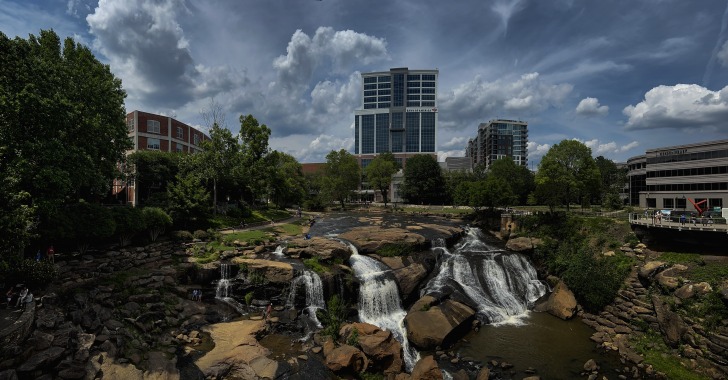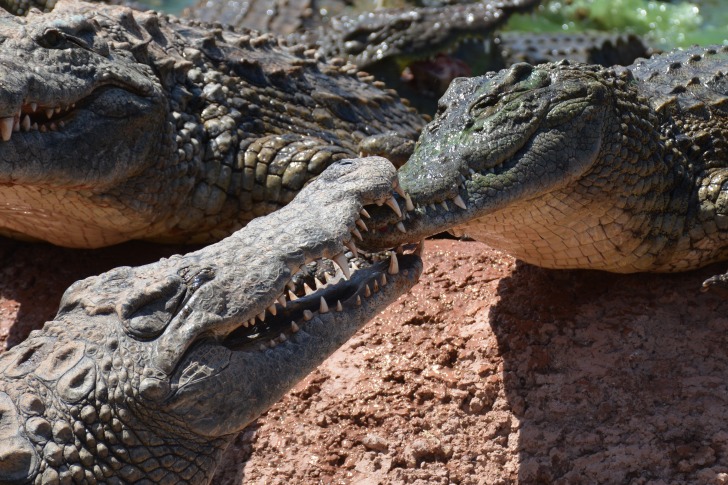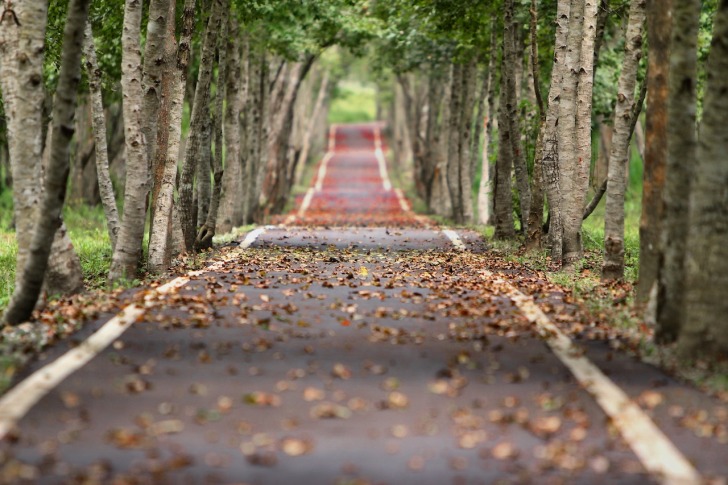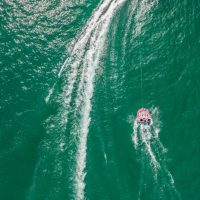The American alligator can be found as far north as coastal North Carolina and as far west as Texas.
This wide area shares similar environmental conditions – plenty of fresh water, high humidity, warm enough temperatures during the winter, and a wide variety of prey.
Florida is the state with the most alligators and the only place on Earth where alligators and crocodiles co-exist, although they rarely interact since they live in different environments.
Greenville, South Carolina, is close to the border where alligators could live.
This begs the question, are there alligators in Greenville?
Keep reading to learn more!

Contents
So… Are Their Alligators in Greenville?
Despite being on that border, Greenville is much too far inland to have a habitat that can support alligators.
If you travel just a few hours south toward the coast, you may see them nesting along freshwater lakes and rivers, but not in Greenville.
Each year, there are claims of residents and visitors spotting alligators in freshwater areas, but there turn out to be hoaxes or individuals who have them as pets.
Is it Safe to Swim in Greenville?
The Greenville area is home to various freshwater rivers and lakes that hundreds of thousands of visitors flock to during the hottest summer months to escape the temperatures.
Some popular destinations include Lake Placid in Paris Mountain State Park, Lake Robinson, Lake Cunningham, Saluda Lake, Lake Cooley, and Pinnacle Lake in Table Rock State Park.
While these can be wonderful destinations to kick back, relax, and cool off, there are several precautions you must take, including:
Boating Channels
Getting struck by a boat or any related equipment can cause severe injury or even death if you’re not careful.
Sticking to the shorelines and staying away from any boating channels is the best way to avoid this.
If you begin to drift away from shore and into boating or jet ski lanes, swim back immediately to avoid an accident.
Watersports are popular in Greenville lakes and rivers, so it’s important to be vigilant when swimming.
Harmful UV Rays
The sun produces harmful UV rays that can wreak havoc on your skin over the short- and long-term.
It’s surprising that this is the most harmful and realistic daily precaution on this list, yet also the most ignored.
South Carolina summers are especially toasty, especially when the fun is in full force in the afternoon.
While you may feel cool in that wonderful freshwater, you are secretly baking away without sunscreen.
Therefore, it’s critical to apply and reapply sunscreen throughout the day.
Failure to do so will result in painful sunburns in the short term and, over a prolonged period, can lead to skin cancer.
Never Swim in Inclement Weather
Swimming during inclement weather is just asking for trouble.
In addition to the unstable currents and choppy waters, you could be struck by lightning while out in the open waters.
Also, it’s much easier to drown in unpredictable weather than during calm conditions, regardless of how well you swim.
Therefore, never go in the water during any kind of inclement weather and if a storm suddenly appears, exit the river or lake.
Rip Currents
While rip currents are less likely in lakes, they can occur, especially during inclement weather.
However, currents are critical to watch out for in freshwater rivers around Greenville.
They can whisk you downriver and into in-water obstacles, like rocks, in an instant if you aren’t paying attention.
For this reason, sticking to the designated swimming areas is critical.
If there aren’t any, swim where others are also, and be mindful of underwater currents you cannot observe.
Interesting Alligator Facts in Greenville
Although alligators are not naturally found around Greenville, many interesting facts about the American gator intrigue scientists to continue studying their behavior, impact on the environment, diet, and other aspects of the gator’s life.
Some of these interesting facts include the following:
- Alligators are cold-blooded, so they utilize their local environment by digging holes to trap heat or lie in the sun on rocks.
- Alligators utilize their large tails to propel through the water at fast speeds.
- An alligator has webbed feet, which makes them advanced swimmers.
- Gators begin the reproduction process as early as ten years old.
- Gators can appear like logs floating in the water, so don’t disturb anything that looks like a log while swimming.
- Male alligators are generally larger than female alligators.
- Scutes are scattered across alligators’ bodies that function as armor to provide protection.
- The American alligator is the largest crocodilian in the U.S.

Alligators vs. Crocodiles
Alligators and crocodiles are commonly mistaken for one another.
However, many features of each show the two reptilians are vastly different, despite being from the same animal family.
To understand the differences, consider the following points:
Behavior
Alligators are terrified of humans and try to get away from them as fast as possible.
However, if an alligator feels threatened, is cornered, or ventures near its nest, it will protect itself and its territory at all costs, thus attacking you.
Crocodiles are significantly more aggressive and see every moving behind as food, including humans.
While it’s best to stay away from both, crocs are significantly more dangerous than gators.
Environment
Alligators are always found in freshwater locations because they don’t possess the organs to process salt.
These locations include lakes, rivers, swamps, marshes, and other wetlands.
While Greenville has plenty of this environment type, it’s too far inland, so it becomes too cold in the winter for a gator to survive for long periods.
Crocodiles are the opposite of alligators, requiring saltwater environments to live.
So while they can survive in freshwater for short periods, they prefer saltwater and coastal environments.
Features
Male alligators max out at around 16 feet in length, while male crocodiles stop growing at 23 feet.
Also, alligators have cone-shaped teeth with a downward-closing jaw and u-shaped south, so you can see the top row of teeth.
Crocs feature a V-shaped snout with sharp teeth and a top-closing jaw that exposes the top and bottom teeth.
Alligators devour their prey by crushing them with powerful jaws, while crocodiles tear their prey apart with sharp teeth.
Gators can also be identified by their dark green color and small black receptor spots near the jaw, which are used for swimming and catching prey.
Crocodiles will usually appear in a camouflage black, brown, grey, and green pattern to blend with the surroundings.
Species
Alligators and crocodiles are part of the same crocodilian family.
However, the American and Chinese alligators are the only two gator species on Earth.
It is estimated that there are only around 2,000 Chinese alligators left in the world, living in a small section of the Yangtze River Delta, whereas millions of American alligators exist.
Crocodiles can be part of 13 species around the world.
3 Safety Tips for Swimming in Alligator-infested Waters
Avoid Wearing Jewelry
While you may be seeking jewelry that glistens in the sun when the light reflects through the crystals and diamonds, leave them at home when swimming in alligator-infested waters.
Fish scales often shine and glisten in the sun, so gators could catch this reflection and assume you are a fish.
This tip is important for any land- or water-based animal, as you don’t want to draw attention when out in the wilderness.
Provide Gators with a Clear Exit Path
Since gators are scared of humans, if you come across one, they will want to move far away from you, so let them.
Never corner an alligator, and always give it a clear retreat path.
If you ignore this tip, they will feel threatened, and the fight response will kick into gear, thus attacking you.
That means opt against the Instagram photo, take the shot from a distance, then utilize Photoshop to crop you in next to the alligator.
Vegetation Areas
While you don’t need to worry about gators in Greenville freshwater bodies, in alligator-infested waters, avoid vegetation areas that are poking through the waterline.
These areas offer the perfect place for alligators to create nests.
Therefore, if you wander over to this part of the shoreline and they are nesting, be prepared for a hissing warning to stay away, as there could be offspring in the area.
This is especially true when coming across female gators.
Summary
Unless they are pets that have been released into the wild, alligators are not native to the Greenville, South Carolina, area.
While there are plenty of other considerations when swimming in the local rivers and lakes, alligators are not one of them.
If you come across an alligator in this area, slowly move away from them and contact the authorities to move the creature to friendlier grounds.
In South Carolina, the sun is your worst enemy and best friend, and staying away from boating lanes is the two most important precautions.
Greenville Safety Overview
READ THE FULL REPORT: Greenville Safety Review
Safety Index:
- OVERALL RISK: LOW
- TRANSPORT & TAXIS RISK: LOW
- PICKPOCKETS RISK: LOW
- NATURAL DISASTERS RISK: MEDIUM
- MUGGING RISK: LOW
- TERRORISM RISK: LOW
- SCAMS RISK: LOW
- WOMEN TRAVELERS RISK: LOW
Frequently Asked Questions
Where are alligators most likely to attack?
Most think alligators will attack humans on land or above water.
This is a myth as they are amazing swimmers, so they attack underwater.
Alligators have an extra internal appendage called a glottis, which allows them to capture and consume prey underwater.
Like when a shark dips its fine below the water before an attack, an alligator will dip its head to attack underwater.
While humans aren’t part of the alligator food chain, if provoked or you are mistaken for a fish or animal, they will attack.
When are alligators most active?
Alligators are nocturnal creatures, which means they begin hunting around sunset and throughout the night.
While you may see some during the day, they are likely sleeping and will be less aggressive unless you wake them up from a nap!
Alligators are most aggressive during mating season, which varies based on the location, but most mating occurs in late spring or early summer.
This is the worst possible time to decide to swim in gator-infested waters, so steer clear during mating season to be safe!
What are easy ways to tell if a gator is in a body of water?
First, gators tend to hang out near the shoreline, so they scour the area in search of these creatures.
Alligators often look like logs when floating on top of the water, so look closely to identify if it’s wood or skin.
Additionally, gators tend to sunbathe on the shores, so they search for sliding marks toward the water.
Second, listen for hissing, which is a warning you are too close and need to back away or leave their territory.
If this occurs, slowly retreat to safer waters or ground since quick movements can trigger an attack.
Finally, look in shallow areas with plenty of vegetation, which provides protection and obstructions from prey seeing this predator.












As a local, I can confirm that there are no alligators in Greenville, South Carolina and it is safe to swim in the freshwater rivers and lakes as long as you take precautions such as avoiding boating channels and protecting yourself from harmful UV rays.